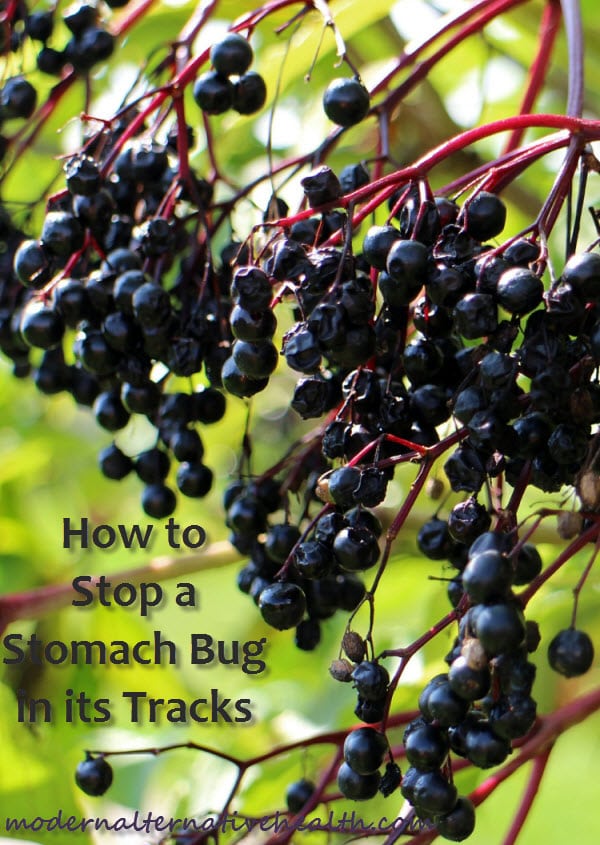By Danielle, Contributing Writer
We all dread the common cold, but nothing is worse than a stomach bug. They seem to ravage through homes quicker than a toddler with poop on his hands (you know what I mean – remember that wall?).
What is the Cause of Stomach Bugs?
Most stomach bugs, also called gastroenteritis, are viruses which attack your gastrointestinal system. They produce vomiting, diarrhea, nausea, fever, headache and sore muscles.
Note that many people believe that the flu — as in the influenza viruses A and B — is a stomach bug, when it is really a respiratory illness.
Norovirus is the most common stomach virus in the United States, causing about 90 percent of the stomach bugs per year. A stomach virus can last from one to ten days, depending on the state of the host’s immune system. Most viruses clear our systems properly and create life-long antibodies without complications.
If your immune system is not functioning at high capacity, you could develop complications. The most common complication is dehydration, though we do not want to completely stop the vomiting and diarrhea, as this is how our immune system clears the toxins from the viruses out of our immune system. But, we do want to replace the fluids lost.
Flu viruses are highly contagious, so if you or your little one brings one home, it’s best to start treating the entire family immediately.
Like all viruses, we want our systems to effectively fight the virus and create antibodies. But let’s go over some ways to boost our immune system and get over the fun before all our walls are wall-papered with those beautiful, brown prints.
5 Ways to Stop a Stomach Bug In Its Tracks
#1: Start with Fluids
As mentioned before, dehydration is the most common complication, and a dehydrated body can make it more difficult for your immune system to clear the virus. Ensure the sick person is consuming at least 8 or more cups of filtered water per day, and supplement with electrolyte drinks if tolerated. Do not use Pedialyte, Gatorade or other sports drinks, as these are laden with preservatives and dyes which your body will also have to fight and metabolize when it needs to be focusing on clearing your virus. Get a simple natural electrolyte drink recipe.
#2: Grab the Charcoal
Activated charcoal has been shown to bind to organic particles and carry them out of your body. Take one to two capsules at first sign of stomach illness. Continue to take another capsule twice a day until the illness is cleared.
#3: Go Herbal
Make a tea of mint if you are mostly experiencing digestive discomfort. If you have a fever, grab the elderberry syrup or make a tea from dried elderberries and echinacea, both which are known to aid the body in clearing pathogens.

#4: Find a Lemon
Freshly squeezed lemon juice has been known to kill pathogens which cause diarrhea. Take one teaspoon of freshly squeezed, organic lemon juice upon symptom onset. If you have a little one or can’t stomach that much citrus, try a teaspoon of dried, ground blueberries. Blueberries can also help inhibit diarrhea in children, and have even been known to stop e. coli bacteria.
#5: Get the Oil
Germ-fighting essential oil, that is. The essential oil blend of clove, lemon, cinnamon, rosemary and eucalyptus is known to be one of the best virus killers. Dilute one to five drops (this is not recommended to use in young children) in a carrier oil, such as almond, avocado or coconut, and apply to the soles of feet.
Stomach bugs can spell a week or more of misery for your family, but the virus can be nipped in the bud with these natural remedies. Be sure to have them on hand to quicken the virus next time it visits your home.


Thank you for your help! Your kindness is amazing and your patience is awesome 🙂
would just lemon essential oil work?
You can not just use lemon. The combination of essential oils will kill the germs, lemon on its own will not kill the germs. If you like the scent of lemon you could put it on your temples and it will soothe you, but it will not kill the germs.
A tsp of AVC in hot water. You can add a bit of honey to sweeten. Sip on it at first signs of queasiness.
When you say the essential oil blend applied to the feet is not recommended in young children at what age or weight would it be appropriate? Young is a fairly broad term so a bit more clarification would be helpful thank you!
Hi Emily! Most essential oils are not recommended for children under the age of 2 and several still that are not recommended for those under the age of 10. Here are our safety recommendations for using essential oils with children: https://mam.stage.earthley.com/2017/02/03/use-essential-oils-safely-children-1/